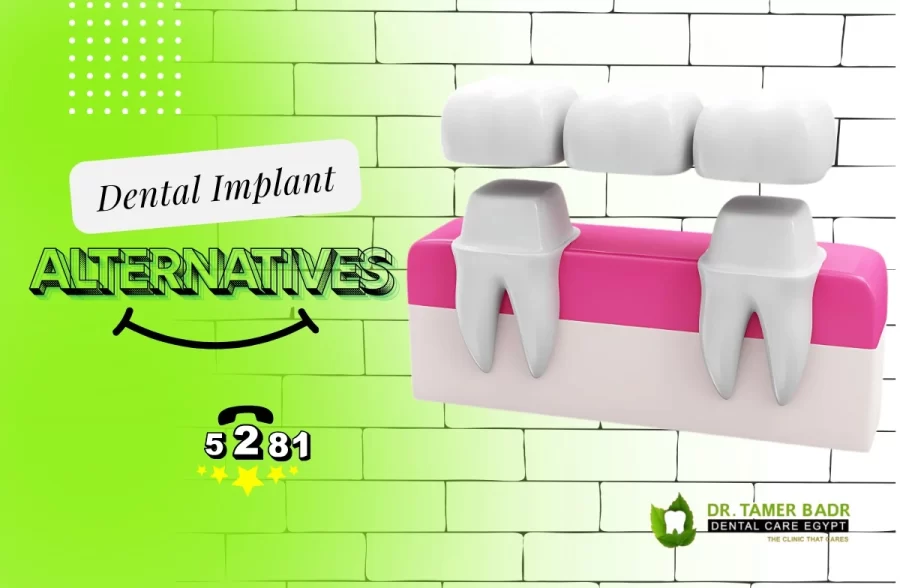
Although the success rate of traditional dental implants is high, making them one of the most effective solutions for replacing missing teeth, this option may not be suitable for all cases. As a result, Dental Implant Alternatives have emerged as viable solutions for patients who may not be ideal candidates for traditional implants.
In this article, we will explore the most common Dental Implant Alternatives and discuss the cases where traditional implants may not be the best option, leading patients to seek alternative solutions.
Why do we resort to dental implant alternatives?
There is no doubt that dental implants are the ideal solution for replacing missing teeth. Although they are artificial, they closely resemble natural teeth in both appearance and function. However, the process involves multiple steps, as it requires embedding a titanium implant into the jawbone. The patient must then wait for the implant to integrate with the bone and gum tissue, which can take up to six months before the new tooth is placed on the implant.
For those seeking alternative options, Dental Implant Alternatives provide effective solutions that can be less invasive and more suitable for certain cases.
Dental implants are one of the most preferred procedures among dentists. However, in some cases where traditional implants may not be suitable, Dental Implant Alternatives become a viable option. These alternatives are often recommended for patients who may not respond well to dental implants, including the following cases:
- The inability to undergo surgical intervention in the gums due to health conditions.
- The risk of excessive bleeding, as some individuals have a medical history that makes them more prone to bleeding than others.
- The inability to commit to the long-term treatment plan required for dental implants. As is well known, the Dental Implant Alternatives can be more suitable for those who cannot wait the 3 to 6 months needed for the implant to fuse with the jawbone.
- The presence of healthy tooth roots, making Dental Implant Alternatives the ideal solution instead of removing natural structures.
- The high cost of dental implants, which makes them unsuitable for some budgets.
- A preference for a simpler and less invasive procedure to replace missing teeth. Unlike traditional implants, Dental Implant Alternatives may not require complex pre-surgical procedures, such as bone grafting, which is necessary when the jawbone is too weak to support an implant
Types of dental implant alternatives
There are various types of Dental Implant Alternatives, and the treating dentist is the one who determines the most suitable option for each case. Below, we will outline the most common Dental Implant Alternatives:
1- Dental Bridges
Dental bridges are one of the most common Dental Implant Alternatives. They are named “bridges” because they literally bridge the gap between missing teeth. They are designed as a set of artificial teeth connected together and secured by attaching them to the natural teeth adjacent to the missing teeth on both sides.
There are different types of dental bridges, including:
Traditional Dental Bridge – Consists of a series of artificial teeth connected together and anchored by dental crowns placed on the adjacent natural teeth.
Maryland Bridge – Held in place using a metal or porcelain framework bonded to the back of adjacent teeth.
Cantilever Bridge – Supported by a single adjacent tooth instead of being anchored on both sides.
Advantages of Dental Bridges:
- Easier to install compared to dental implants.
- Helps maintain jaw alignment by preventing the shifting of surrounding teeth.
- Provides support by distributing bite pressure evenly across the teeth.
- Does not require surgery, making it less painful than dental implant procedures.
- More affordable than dental implants.
Disadvantages of Dental Bridges:
Like any other dental procedure, dental bridges come with some drawbacks, including:
- Cannot replace multiple missing teeth unless there are strong adjacent teeth for support.
- Not as long-lasting as dental implants and may be prone to breakage. Additionally, excessive pressure may weaken the supporting teeth over time.
- Increased risk of damage to adjacent teeth due to added stress.
- Higher chance of tooth decay in the supporting teeth if the bridge is not properly fitted.
2- Dentures
Dentures are another common Dental Implant Alternative used to restore missing teeth. There are different types of dentures, and the choice depends on the patient’s specific needs:
- Partial Dentures – Used to replace some missing teeth. They are designed to match the color of natural teeth and are secured using clasps attached to existing teeth.
- Complete Dentures – Used when the patient has lost all their teeth. These dentures resemble both the gums and the teeth.
- Implant-Supported Dentures – These dentures are fixed onto implants placed in the jawbone, requiring strong and healthy jawbone support.
Advantages of Dentures:
- Easy to install.
- Full and partial dentures are suitable for individuals with weak jawbones.
- Ideal for cases of severely damaged or weakened teeth.
- Helps restore proper pronunciation and speech.
- Allows for easier chewing and eating.
Disadvantages of Removable Dentures:
- May feel uncomfortable while laughing or speaking due to their weight.
- Require a long adjustment period.
- Need regular cleaning and maintenance.
- Can be unstable in the mouth, sometimes slipping while eating or speaking, which can cause embarrassment.
- Need periodic replacement as they wear out and lose their shape over time.
- Can require dietary adjustments, favoring soft foods over hard or chewy ones.
- Must be removed before sleeping.
3- Resin-Bonded Bridges (Maryland Bridges)
Resin-bonded bridges, also known as Maryland Bridges, are a type of Dental Implant Alternative that function similarly to traditional dental bridges. However, instead of using dental crowns to anchor the bridge, they rely on small wings attached to the back of adjacent healthy teeth using a special adhesive. This method avoids excessive reshaping of neighboring teeth, making it a more conservative option.
Advantages of Resin-Bonded Bridges:
- Easy to remove if necessary.
- Do not require extensive modification or drilling of adjacent teeth.
- Reduce the risk of tooth decay in the supporting teeth compared to traditional bridges.
Disadvantages of Resin-Bonded Bridges:
- Prone to frequent detachment, which can cause inconvenience and embarrassment.
- Not strong enough to withstand excessive chewing pressure.
4- Temporary Dentures (“Flippers”)
Temporary dentures, also known as Flippers, are another type of Dental Implant Alternative used to fill the gap left by a missing tooth. These lightweight, removable dentures attach to the gums or the roof of the mouth and play a crucial role in preventing adjacent teeth from shifting or tilting into the empty space.
Advantages of Flippers:
- Affordable compared to other Dental Implant Alternatives.
- Easy to remove and clean.
- Provide a temporary aesthetic solution while waiting for a permanent restoration.
Disadvantages of Flippers:
- Less durable and not a long-term solution.
- Can cause discomfort and irritation to the gums.
- Not as stable as permanent solutions unless fixed on a root.
Common Drawbacks of Dental Implant Alternatives
While Dental Implant Alternatives offer various benefits, they also come with some limitations, including:
- Shorter lifespan compared to dental implants.
- Potential gum irritation and allergic reactions in some cases.
- Lack of strong foundation, except when supported by a dental root.
- Preventive alternatives, such as space maintainers, do not replace missing teeth but only preserve gum structure until an implant procedure is possible.
This everything you need to know about Dental Implant Alternatives, their different types, as well as the advantages and disadvantages of each option. It’s important to remember that the best solution varies from one patient to another.
Only a qualified dentist can determine whether a traditional dental implant or an alternative option is the most suitable based on each individual’s dental needs and overall health condition.
If you’re considering Dental Implant Alternatives, we recommend consulting with a specialist to explore the best treatment plan tailored to your specific case.

